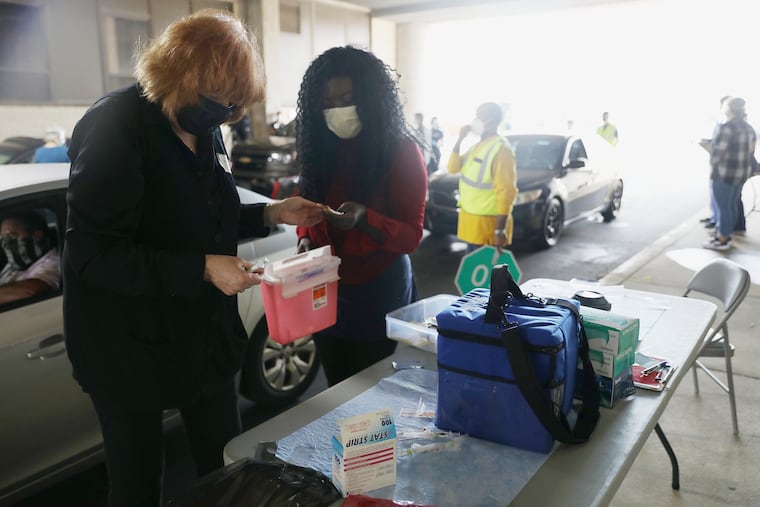Public health in Philadelphia defines this year’s ballot | Opinion
Our votes can lead the way for Pennsylvania and our nation as COVID continue to expose massive health disparities.

Public health is not just on the ballot. It is the ballot. Many of us in the field are very anxious about the coming election and its outcome. What will it mean to the communities we love, live in, and serve? As public health educators, we know that in a true democracy, politics reflect the values of the community and society. However, as public health researchers, we also know too well that true equality for individuals, and their voices, is still lacking in our city, region, and country, tied to an overall lack of equity in the policies and approaches of our governments.
For the past eight months or so, COVID-19 has dominated our focus, but the disparities exposed by the pandemic are unfortunately neither new nor surprising. We have seen disparate health outcomes and tried to address them in many realms before. The political process determines the allocation of resources and services to our communities. Policies also provide the road map for where we as a city, state, and country want to go, what we are striving to become, how we will do it, and who gets to come along.
Philadelphia has long illustrated how one’s zip code may be a better predictor of life expectancy than one’s genetic code. Simply put, despite a city full of hospitals and academic medical institutions, some of us will live 20 years longer than others in neighboring zip codes. The causes vary and stack up — for example, Philadelphia continues to have the highest overdose mortality rate of any large city in the nation, affected greatly by slow-to-change state-level regulations. In 2019, overdose deaths increased, after a one-year decline, with significant increase among Black and Hispanic populations. Almost half of the Black people who died of overdose since the COVID shutdown were unemployed. Our region continues to suffer from deaths of despair.
A report from the Philadelphia Department of Public Health found more than 80% of childhood deaths occurred in non-Hispanic Black and Hispanic children. In Pennsylvania, Black women are three times more likely to die in relation to childbirth than white women. It is impossible to negate or overlook the impact of institutionalized racism embedded within these numbers, shaping access to health care and health outcomes. As a so-called majority minority city, we know racism is on the ballot.
Racism, alongside poverty, has also fed our city’s rising tide of gun deaths, exacerbated by the opioid crisis and then the pandemic. Philadelphia is hamstrung by Harrisburg’s inaction. Preemption laws (not allowing localities to pass their own laws) make it illegal for Philadelphia to use legislation to address the root causes of gun violence within our borders. The statehouse’s failure to close holes in background checks, or pass lost and stolen legislation, keeps a steady flow of guns entering struggling communities. If we do not vote for change in Harrisburg, we will continue to react to the crisis rather than prevent it.
In Philadelphia, one in three children lives in poverty, limiting their possibilities before they have even started. Pennsylvania’s cities and counties have illustrated how investment in infrastructure and systems (such as efforts to “green” Philadelphia’s stormwater infrastructure) can bolster resilience and well-being. We can, through our votes, make it clear that the quality and safety of our schools, built environment, parks, and green spaces are of vital importance.
It could be understandable, in a region like Philadelphia and its collar counties, that our neighbors shake their heads at more political discussion before putting their heads down and getting back to work. Some don’t feel a part of the politics, in general, or these elections, in particular. But these are not political issues, they are moral ones. They are our issues as a city and state. They simply reflect our ability to live in safety and care for one another in a free world.
» READ MORE: 2020 Pennsylvania Endorsement Guide | Editorial
With early voter turnout and a nearly unprecedented number of registered voters, we see that our community is stepping up. Philadelphians know what it is to be underdogs — to feel overlooked and undervalued. But we also know Brotherly Love and Sisterly Affection. We know what it means to rally around and propel each other forward in the final seconds before the buzzer. Our state and region hold so much power — not only for ourselves, but for our country at large as a swing state. This is our time. And by voting for our own health, we can flex our full muscle and show our full might.
» FAQ: Your coronavirus questions, answered.
Priya E. Mammen, MD, MPH, FCCP, is an emergency physician, public health specialist, chair of the Section of Public Health and Preventive Medicine at the College of Physicians of Philadelphia. Christen J. Rexing, PhD, MPH, is an assistant professor of urban public health and nutrition at La Salle University and member of the Section of Public Health and Preventive Medicine Steering Committee at the College of Physicians. Rosemary Frasso, PhD, FCCP, is public health program director at Jefferson College of Population Health and a member of the Section of Public Health and Preventive Medicine Steering Committee at the College of Physicians.